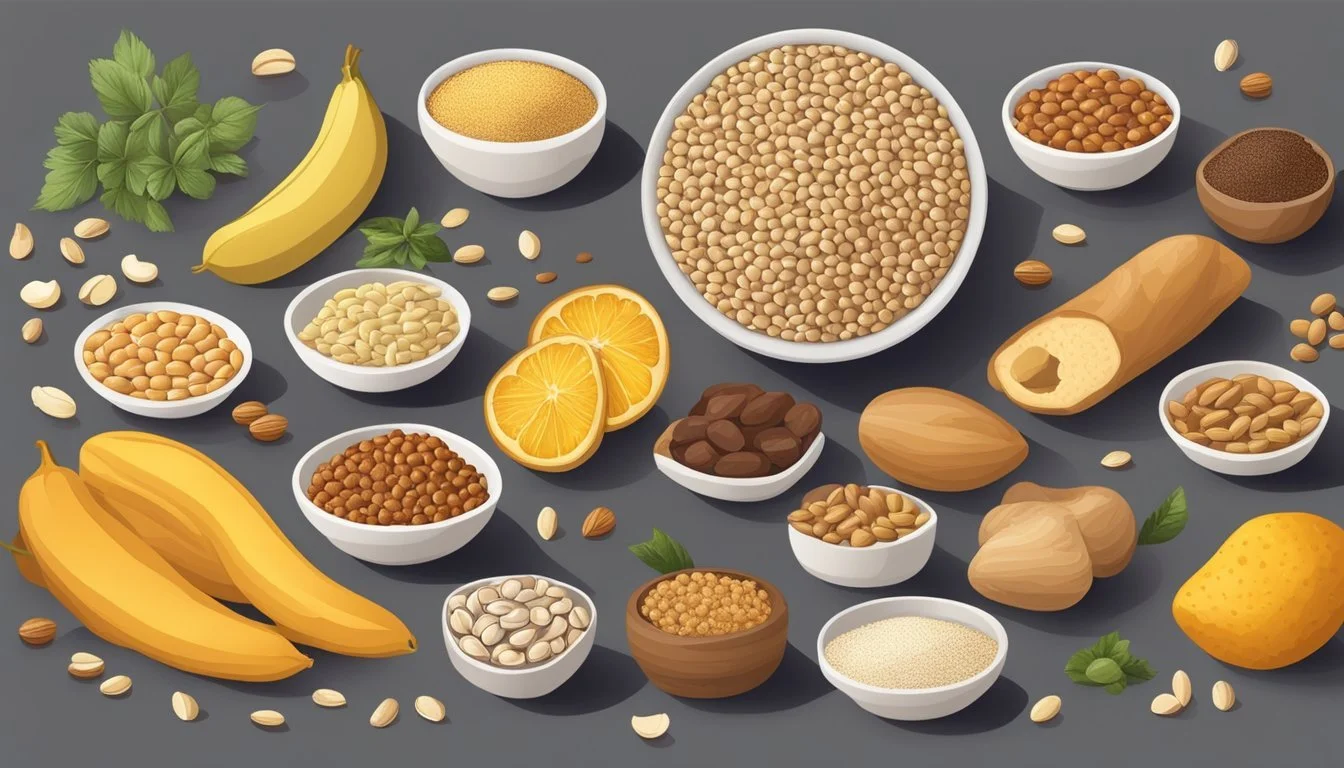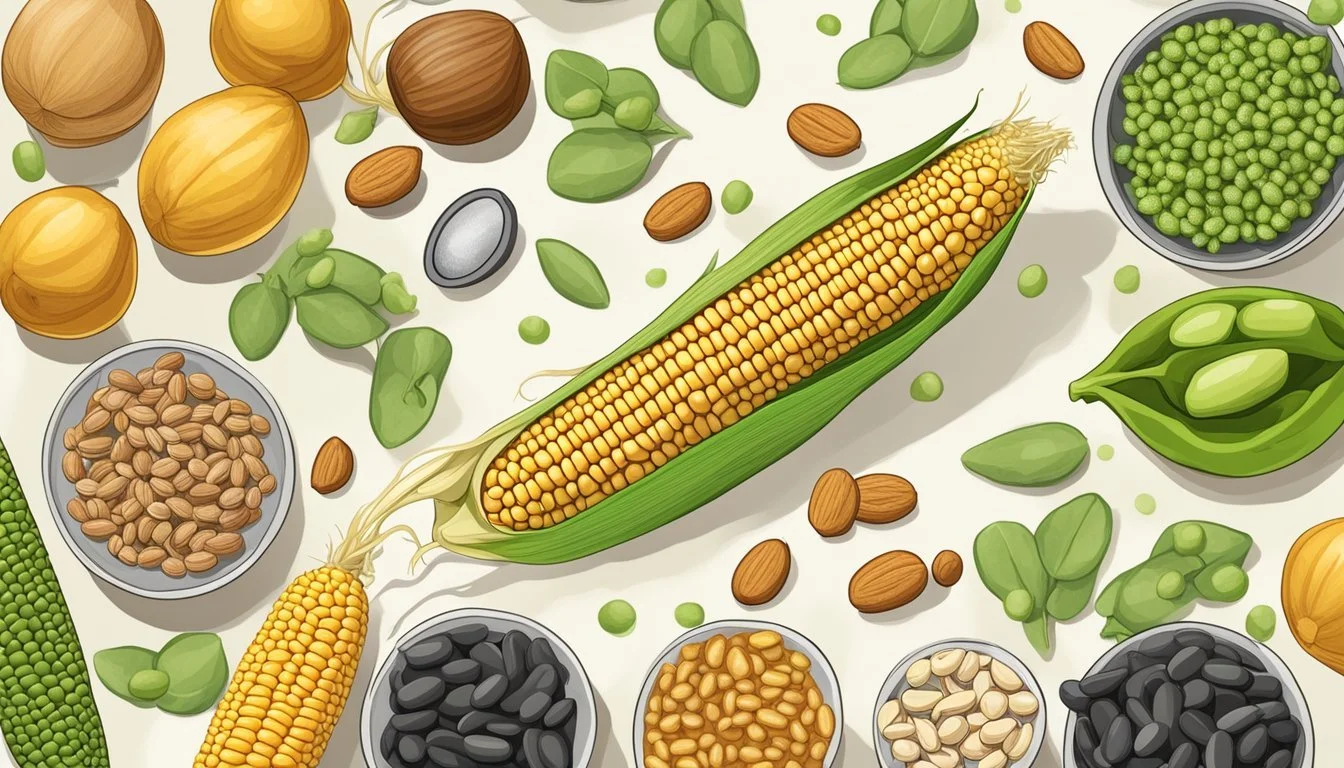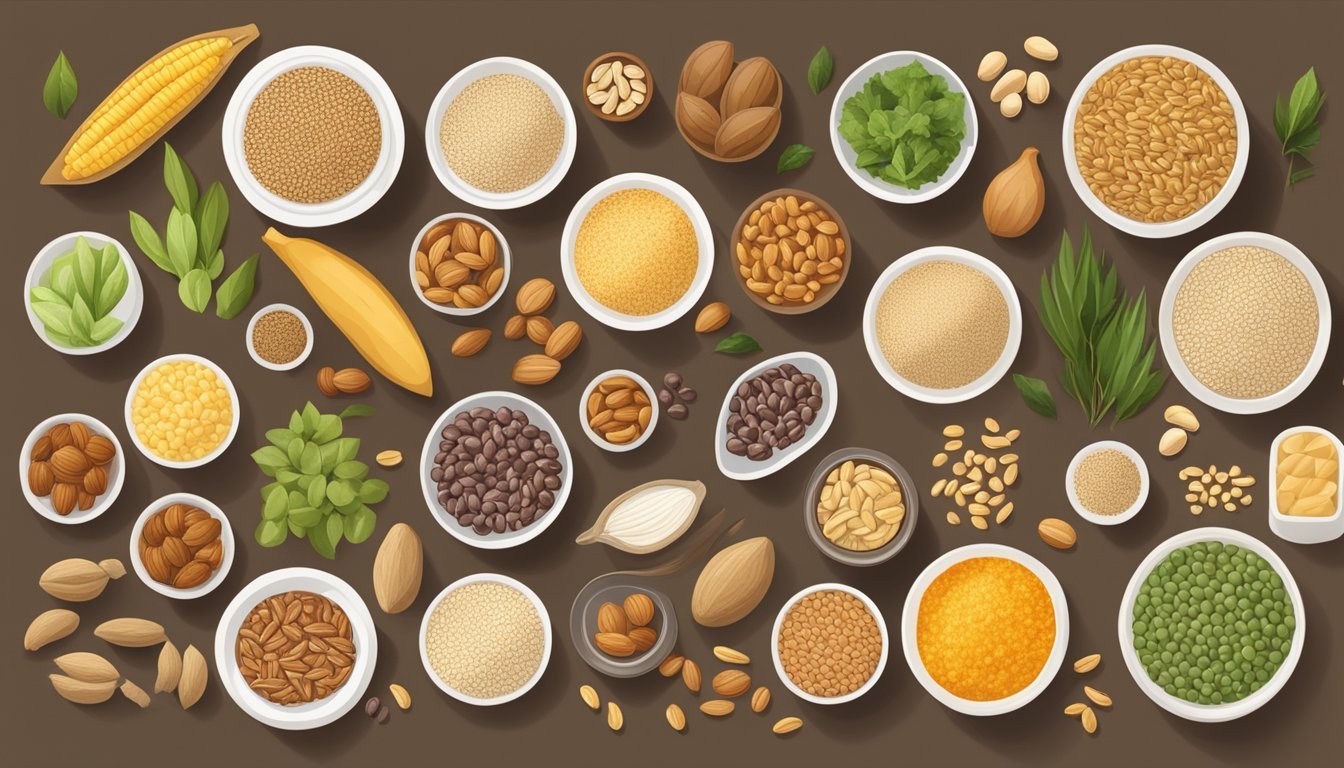Top Spermidine-Rich Foods for Longevity and Health
Boosting Health and Longevity
Spermidine, a naturally occurring compound found in various foods, has garnered significant interest for its potential health benefits. It is known to play a role in cellular growth, longevity, and maintaining overall well-being. Incorporating spermidine-rich foods into one's diet may support various aspects of health, including anti-aging and cellular vitality.
While the human body can produce spermidine, dietary sources remain crucial for optimal levels. Exploring foods that contain high amounts of spermidine allows individuals to make informed dietary choices that can enhance their health and longevity.
1) Natto
Natto, a traditional Japanese dish made from fermented soybeans, is renowned for its high spermidine content. Spermidine is a polyamine that plays a critical role in cellular processes, including the activation of autophagy.
Consuming natto regularly can significantly increase spermidine levels. Research indicates that daily intake of 50 to 100 grams of natto can enhance polyamine content in the body.
The fermentation process involved in making natto not only preserves the spermidine content but also boosts the dish's nutritional value. This makes it an excellent source of this important compound.
In addition to spermidine, natto is also rich in protein, fiber, and Vitamin K2, which supports bone health. Its unique, strong flavor and sticky texture might take some getting used to, but it's worth incorporating into a diet for those seeking high spermidine foods.
2) Durian
Durian is a tropical fruit known for its distinctive smell and rich, custard-like texture. Beyond its unique taste and aroma, durian is notable for being high in spermidine. This polyamine compound is associated with several health benefits, including cellular regeneration and anti-aging properties.
The high spermidine content in durian makes it an interesting choice for those looking to boost their intake of this nutrient. Research shows that consuming spermidine-rich foods can support overall well-being and longevity. Durian is among the top foods for achieving these dietary goals.
In addition to spermidine, durian also contains several vitamins and minerals, including vitamin C, potassium, and dietary fiber. These nutrients contribute to the fruit's health benefits, making it a worthy addition to a balanced diet. Given its potent nutritional profile, durian can be a beneficial choice for those seeking to enhance their health through diet.
3) Aged Cheese
Aged cheese is a prominent source of spermidine, a polyamine compound known for its potential health benefits, including anti-aging properties. Cheddar cheese, specifically aged for at least one year, has been noted for its high spermidine content. This aging process allows the concentration of spermidine to increase significantly.
Parmesan and Gouda are other examples of aged cheeses rich in spermidine. These cheeses undergo a lengthy maturation process, enhancing their flavor and nutrient profile. Including aged cheese in one's diet can be a beneficial way to naturally increase spermidine intake.
The flavor and texture of aged cheese make it a versatile ingredient in many dishes. It can be enjoyed on its own, added to salads, or included in various cooked meals. A small serving can contribute a substantial amount of spermidine to the diet.
4) Soy Products
Soy products are a significant source of spermidine, a polyamine known for its potential health benefits. Common soy-based foods include tofu, tempeh, soy milk, and edamame.
Tofu, made from soybeans, is versatile and can be used in a variety of dishes. It has been shown to contain considerable amounts of spermidine.
Tempeh, another fermented soy product, is high in spermidine. The fermentation process can enhance its nutritional profile, including its spermidine content.
Soy milk, used as a dairy alternative, is also rich in spermidine. It can be consumed directly or used in recipes as a substitute for cow's milk.
Edamame, young green soybeans, offer a convenient and nutritious snack. They are easily prepared by boiling or steaming and have notable spermidine levels.
Including these soy products in one’s diet can help increase spermidine intake, contributing to potential health benefits.
5) Green Peas
Green peas are a notable source of spermidine, a compound associated with various health benefits. Found abundantly in these legumes, spermidine content can reach more than 50 mg per kilogram.
Whether fresh or frozen, green peas retain a significant amount of spermidine. This makes them a convenient and accessible option for those looking to increase their intake of this beneficial compound.
Green peas also offer additional nutritional benefits, including vitamins, minerals, and fiber. They can be easily incorporated into various dishes such as salads, soups, and stews.
Regular consumption of green peas could contribute to overall dietary health, making them an excellent addition to a balanced diet. With their versatility and nutrient density, green peas are a practical choice for anyone aiming to boost their spermidine intake.
6) Mushrooms
Mushrooms are a standout source of spermidine. Different varieties such as Black Shimeji and common button mushrooms are rich in this compound.
In terms of nutritional content, mushrooms also offer vitamins B3 and D, along with minerals like selenium, potassium, and phosphorus. This makes them beneficial beyond their spermidine content.
Adding mushrooms to your diet can boost your intake of spermidine. They can be easily incorporated into salads, soups, or stir-fries.
For those who prefer simplicity, mushrooms can be consumed raw, offering a convenient way to enjoy their benefits.
In terms of spermidine concentration, mushrooms can provide up to 120 mg per kilogram. This positions them as one of the top plant-based sources of spermidine.
7) Wheat Germ
Wheat germ is notably high in spermidine, making it a valuable addition to diets aimed at increasing intake of this beneficial compound.
This part of the wheat plant is abundant in essential nutrients, including vitamins, minerals, and proteins.
Incorporating wheat germ into meals is straightforward. It can be added to cereals, smoothies, or baked goods, enhancing both nutrition and flavor with ease.
Eating wheat germ regularly is an efficient way to boost spermidine levels without drastic dietary changes.
8) Corn
Corn is a notable source of spermidine, a compound associated with various health benefits. This popular grain offers a versatile option for those looking to boost their spermidine intake.
Both fresh and dried forms of corn, including cornmeal and popcorn, contain appreciable amounts of spermidine. Additionally, corn is a staple in many diets, making it an accessible choice.
Incorporating corn into meals can be straightforward. It can be enjoyed on the cob, as kernels, in soups, stews, salads, or as a base for many dishes.
Corn is also a good source of fiber, vitamins, and minerals, supporting general health. For those seeking to increase their spermidine consumption, corn provides a practical and nutritious option.
9) Cheddar Cheese
Cheddar cheese, especially the aged variety, is a notable source of spermidine. The concentration of spermidine in cheddar cheese increases as it ages. This process enhances the cheese's flavor and its potential health benefits.
Cheddar cheese aged for at least one year contains significantly higher levels of spermidine compared to non-aged cheese.
Many mature cheeses, including cheddar, are rich in spermidine. This makes them an excellent addition to a diet focused on longevity and overall health.
Including a regular serving of aged cheddar cheese can be an effective way to boost spermidine intake naturally. Whether enjoyed alone or as part of a meal, it offers both nutritional and culinary value.
10) Green Pepper
Green pepper is a notable source of spermidine. This vegetable contains a significant spermidine content, estimated at over 90 mg/kg. This makes it one of the richer plant-based sources of this polyamine.
Inclusion of green pepper in the diet can be easy and versatile. It can be added to salads, stir-fries, and various cooked dishes.
In addition to its spermidine content, green pepper offers essential vitamins and nutrients. These include vitamin C, vitamin A, and several B vitamins.
The high water content of green pepper helps in maintaining hydration. Its low-calorie nature also makes it a great addition for those monitoring their calorie intake.
Regular consumption of green pepper can thus contribute to the intake of spermidine while also providing a range of other health benefits.
Benefits Of Spermidine-Rich Foods
Spermidine-rich foods are associated with significant health advantages, specifically in areas concerning health, longevity, and cognitive function.
Health And Longevity
Spermidine has been identified as a compound that may contribute to increased lifespan. Studies suggest that it promotes autophagy, a cellular process where damaged cell components are broken down and recycled, leading to improved cellular health. This process can prevent the accumulation of cellular damage and support overall cell function.
Research indicates that spermidine can help enhance cardiovascular health. By maintaining the integrity and function of cells in the blood vessels, spermidine may reduce the risk of age-related cardiovascular diseases. Additionally, it may have anti-inflammatory properties, which are crucial for preventing chronic diseases.
Moreover, spermidine might have potential anti-cancer properties. Some findings propose that regular consumption of spermidine-rich foods can inhibit the growth of certain cancer cells. These health benefits make spermidine a valuable addition to a balanced diet aimed at promoting longevity and reducing age-related health risks.
Cognitive Function
Spermidine is also being researched for its potential cognitive benefits. The compound may support improved brain health by enhancing brain cell autophagy, leading to better maintenance and function of neurons. This process helps in clearing away damaged proteins that could otherwise accumulate and disrupt cognitive processes.
Evidence suggests spermidine can improve memory and learning capabilities. By promoting cellular maintenance in the brain, spermidine may help preserve brain function as people age. This is particularly beneficial in combating neurodegenerative conditions such as Alzheimer's disease, where protein accumulation and cell damage play a critical role.
Cognitive benefits of spermidine extend to mood regulation as well. By positively influencing brain health, spermidine may contribute to overall mental well-being, potentially reducing the risk of cognitive decline and mental health disorders as the population ages.
How To Incorporate Spermidine Into Your Diet
Incorporating spermidine into your diet can be achieved by including specific foods such as aged cheeses, certain vegetables, and meats. Planning meals and knowing how to prepare these foods can make a significant difference.
Daily Meal Planning
Creating a balanced daily meal plan that includes spermidine-rich foods is essential. Start the day with a breakfast featuring items like whole grain toast with aged cheese. For lunch, consider a salad with green peas and a sprinkle of corn. Dinner could include chicken liver or shellfish paired with vegetables like pumpkin. Snacks can include nuts like soybeans.
Example Daily Meal Plan:
Meal Suggestions Breakfast Whole grain toast with aged cheddar, green tea Lunch Green pea salad with corn, olive oil, and lemon dressing Dinner Grilled chicken liver with sautéed pumpkin Snacks Soy nuts, a small piece of blue cheese
Cooking Tips And Recipes
Simple cooking methods can preserve spermidine content. When cooking vegetables like green peas and pumpkin, steaming or roasting is preferable. For meats such as chicken liver, grilling or light sautéing helps maintain nutritional value.
Sample Recipe: Grilled Chicken Liver
Ingredients: Chicken liver, olive oil, garlic, rosemary, salt, and pepper.
Instructions: Marinate chicken liver in a mix of olive oil, minced garlic, and rosemary for 30 minutes. Grill over medium heat for about 5 minutes on each side. Season with salt and pepper to taste.
Combining these ingredients into appealing recipes ensures that incorporating spermidine into the diet is both enjoyable and beneficial.








